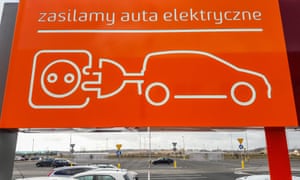https://www.theguardian.com/environment/2020/may/28/eu-green-recovery-package-sets-a-marker-for-the-world?fbclid=IwAR1MOMyiVHSVMIoaBIry1BlMtgOHLuJJtSuUQFdNAt6Fu4VyaBLX8N81mc8
EU green recovery package sets a marker for the world
The bloc is showing the way in rebuilding coronavirus-ravaged economies to fight the climate emergency
The European commission has put down a marker for the world with its green recovery package. It sets a high standard for other nations, using the rebuilding of coronavirus-ravaged economies to tackle the even greater threat of the climate emergency, in principle at least.
With the world fast approaching the point when climate chaos becomes inevitable, how the trillions of recovery dollars – or euros – are spent is a use-it-or-lose-it moment, so what the EU does really matters. Climate change is a global crisis, meaning all nations must act and some must lead the way.
Under Donald Trump, the US is slashing green protections while the biggest polluter, China, is sending mixed messages by backing coal power stations as part of its recovery. The UK, host of the next critical UN summit, has been all but silent.
The EU’s plan seeks to pour money into emissions-busting sectors: €91bn (£81bn) a year for home energy efficiency and green heating, €25bn of renewable energy, and €20bn for clean cars over two years, plus 2m charging points in five years. Up to €60bn will go to zero-emissions trains and the production of 1m tonnes of clean hydrogen is planned.
At least a million green jobs will be created, with workers in polluting industries helped into new roles, a critical part of the plan. Increasing the Just Transition Fund more than fivefold to €40bn minimises the risk of protests against green measures, especially in states with the heaviest coal use such as Poland, Germany and Romania, which will be among the biggest recipients. This is politically necessary, despite investment in the green economy already being a no-brainer.
The EU plan may even have a direct impact on the rest of the world, with a border tax on carbon-intensive industrial imports from other nations potentially raising up to €14bn.
But despite the European commission saying “public investments in the recovery should respect the green oath to ‘do no harm’”, critics worry there are no hard guarantees against the money seeping into dirty projects. The Covid-19 crisis has seen polluters lobbying hard for bailouts.
The Just Transition Fund will be routed through the European Investment Bank, but campaigners say its climate criteria allow the backing of gas projects that would lock in emissions for years. Another key fund, the €150bn React EU programme, allows member states to decide how to spend the money – most of the almost €2tn in coronavirus rescue funds spent by EU nations so far has had no green guarantees.
Worse, say critics, climate conditions on large parts of the main EU budget have been lifted for three years because of the pandemic. The proportion of the budget reserved for climate projects remains stuck at 25%, despite demands by the European parliament and many others to raise it.
The commission rejects these criticisms, saying the “objective of the green economy is present throughout the whole management of the funds”. Whether this oversight proves effective will be the critical test.
Nonetheless, green-leaning business and investor groups have welcomed the recovery package, calling it bold and substantive. To turn it into reality, there will now be weeks of wrangling between EU countries to finalise the deal.
We must hope that they, and the rest of the world’s nations, in turn, bear in mind the words of the EU commission president, Ursula von der Leyen: “Sooner or later we will find a vaccine for the coronavirus. But there is no vaccine for climate change. Therefore [we] need a recovery plan designed for the future.”
We’ve never had a better chance …
… to make a greener world. Covid-19 has delivered unusual environmental benefits: cleaner air, lower carbon emissions, a respite for wildlife. Now the big question is whether we can capitalise on this moment. The Guardian aims to lead the debate from the front.
In the weeks and months ahead, our journalism will investigate the prospects for a new green settlement. We will showcase the big thinkers and protagonists and amplify the arguments for authorities everywhere to consider as they lead us out of coronavirus.
Our credentials suit us well to the task: we are independent, we have no owners, no paymasters or oligarchs pulling the strings. We have committed to carbon neutrality, divested from the oil and gas sectors and renounced fossil fuel advertising. But at this crucial moment, news organisations like ours are facing a daunting financial challenge. As businesses everywhere feel the pinch, the advertising revenue that has long helped to sustain our work has plummeted. We need you to help fill the gap.
Our journalism is open to all because we believe everyone deserves access to factual information, regardless of where they live or what they can afford to pay. If you can afford to, we hope you will consider supporting our journalism today.
The Guardian believes that the climate crisis we face is systemic. We will inform our readers about threats to the environment based on scientific facts, not driven by commercial or political interests. We will keep reporting on the efforts of individuals and communities around the world who are fearlessly taking a stand for future generations and the preservation of human life on earth. We want their stories to inspire hope.
We need your support to keep delivering this kind of open, committed independent journalism. Every reader contribution, however big or small, is so valuable. Support the Guardian from as little as $1 – and it only takes a minute. Thank you.


沒有留言:
張貼留言